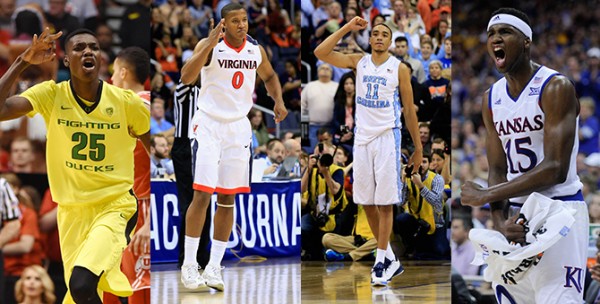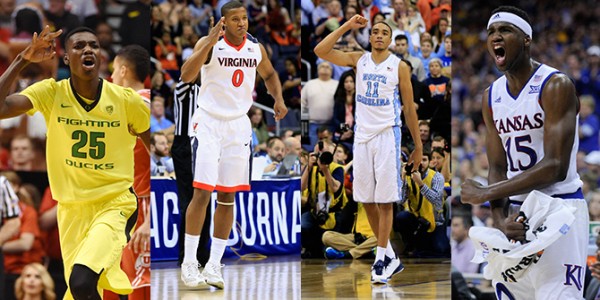
The number one seeds chosen for the 2016 NCAA Tournament – Kansas, Virginia, North Carolina and Oregon, might not actually be the best four teams in the nation. And as far as their compatibility with what usually makes a champion? There are questions about whether or not each of them are good enough to go all the way.
Going by Kenpom, the number one seeds this season are all on the site’s top 9, with Kansas being number one, Virginia coming in second, North Carolina 4th and Oregon 9th. Compare that to last season, in which the four number one seeds (Kentucky, Duke, Wisconsin and Villanova) shared the top 6. Three of those teams made the Final Four in a field that didn’t have as many upsets as expected, with the Blue Devils eventually winning the national title against the Badgers.
This season? Both Kansas and Virginia have an offense and defense efficiency that’s in the top 10 in the nation efficiency-wise adjusted for opponents. North Carolina have incredible depth and offense, but they’re just 16th defensively (although they might not need to show that, and their 61-57 win over Virginia showed they can win slow, “ugly” games). Oregon are 5th offensively in the nation but 50th defensively, which might mean they bested a weak Pac-12, and aren’t good enough to make their first Final Four since 1939 or first Elite Eight since 2007.
Michigan State might meet with Virginia once again, put in the same regional. A #2 seed, the Big Ten champions are second in the nation offensively but just 19th defensively. Villanova, another number two seed and fifth overall on the Kenpom rankings, seem to have better balance with the 11th best offense and 7th best defense. However, their loss to Seton Hall in the Big East championship game does come with a warning that they might once again find themselves knocked out within the first weekend. Since 2009 when they made the Final Four (last Final Four for North Carolina too) they haven’t been to the Sweet Sixteen.
It’s hard looking past Kansas, the #1 team in the nation by the rankings, human and statistical. There’s nothing too impressive about their out of conference schedule, but they lost just three times in the Big 12 (all on the road), beat Oklahoma, Baylor and Texas away from home and haven’t lost a game since January, while looking more than convincing in the Big 12 tournament.
Virginia have not been to the Elite eight since 1995. Yes, they’ve done very well under Tony Bennett, but it comes with just one Sweet Sixteen appearance to show for it. Their record in 2016 shows that playing away from home is an issue for them, with losses to Virginia Tech, Georgia Tech, Florida State, Duke and Miami. Keeping things slow might be an advantage with such a defense, but it also leaves things up to chance and one short here and there. Maybe letting some talent loose could be the answer to the unfulfilled promise.
North Carolina could be misleading. Yes, their road losses in the ACC have come by six points or less and they looked great in the tournament. Not just beating Virginia in the final, but crushing a good Notre Dame team and blowing by Pitt with ease. But some of their losses and their struggles shooting the ball sometimes do raise a warning sign or two. This team is deep, big and experienced. It should be able to go all the way. But something about their flaws will make it less than very surprising if they don’t.
And Oregon? Dana Altman has won at least one game with them in the NCAA Tournament three years in a row. But with a second conference tournament title in four years, plus a regular season title (their first since 2002) comes an awakening in ambitions. Oregon beat both Arizona and Utah on their way to the Pac-12 title, including beating both of them on neutral ground and on the road. They’ve won at USC and UCLA but have also lost in Corvallis, Colorado, California and Stanford. They’re an unknown because of the relative weakness of their conference.
